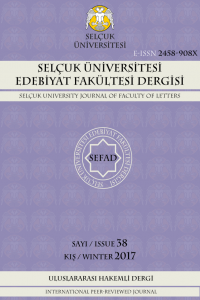Öz
Given the central place it
occupies in human life and relations, it is hardly surprising that romantic
love as well as the distress caused by unrequited love is a universal
phenomenon that has been explored by numerous writers over the years.
Passionate love can be defined as a state of intense desire for fusion with
another. When love is reciprocated and union is achieved, the lover feels a
sense of fulfilment and joyful ecstasy.
If the lover is rejected or scorned, however, s/he is overwhelmed with
an acute sensation of emptiness, often accompanied with feelings of anxiety and
despair. For the purposes of this article, I will focus on representations of
lovesickness in two novels from the Victorian period: Wuthering Heights by Emily Bronte and The Moonstone by Wilkie Collins. Drawing on the sociologist Eva
Illouz’ Why Love Hurts? and the
psychologist Dorothy Tennov’s conceptualization of love and limerence, I will
examine how the emotional trauma experienced by Catherine and Heathcliff in Wuthering Heights and Rosanna Spearman
in The Moonstone causes all three
characters to feel intense suffering and prolonged misery, leading - eventually
- to their destruction.
Anahtar Kelimeler
Lovesickness Victorian literature Wuthering Heights The Moonstone
Kaynakça
- BATAILLE, Georges (2012). Literature and Evil. London: Penguin.
- BLOOM, Harold (2007). Emily Bronte’s Wuthering Heights. New York: Bloom’s Literary Criticism.
- BRONTE, Emily (1847/1994). Wuthering Heights. London: Penguin.
- COLLINS, Wilkie (1868/1993). Hertfordshire: Wordsworth Editions Limited.
- CROUSE, Jamie (2008). “’This Shattered Prison’: Confinement, Control and Gender in Wuthering Heights”. Bronte Studies Vol. 33, November: 179-191.
- FORD, John (1985).. The Lover’s Melancholy. Manchester: Manchester University Press.
- GAROFALO, Daniela (2008). “Impossible Love and Commodity Culture in Emily Bronte’s Wuthering Heights” ELH 75 (4): 819-840.
- GOODLETT, Debra (1996). “Love and Addiction in Wuthering Heights”. The Midwest Quarterly 37 (3): 316-327.
- ILLOUZ, Eva (2012). Why Love Hurts: A Sociological Explanation. Cambridge: Polity.
- KERNBERG, Otto (1995). Love Relations: Normality and Pathology. New Haven and London: Yale University Press.
- LINDHOLM, Charles (1998). “The Future of Love”. Romantic Love and Sexual Behavior. ed. Victor C. De Munck. Westport: Praeger. pp. 17-33.
- LUHMANN, Niklas (2010). Love: A Sketch. Polity Press: Cambridge.
- MOSSMAN, Mark (2009). “Representations of the Abnormal Body in “The Moonstone”. Victorian Literature and Culture 37 (2): 483-500.
- NUSSBAUM, Martha (2001). Upheavals of Thought: The Intelligence of Emotions. New York: Cambridge University Press.
- PHILLIPS, James (2007). “The Two Faces of Love in Wuthering Heights”. Bronte Studies Vol. 32, July: 96-105.
- PYKETT, Lynn (2005). Wilkie Collins. Oxford: Oxford University Press.
- TALLIS, Frank (2004). Lovesick: Love as a Mental Illness. New York: Avalon.
- TENNOV, Dorothy (1979/1999). Love and Limerence: The Experience of Being in Love. Lanham: Scarborough.
Öz
İnsan hayatı ve ilişkilerinde kapladığı merkezi yer göz önünde
bulundurulduğunda, romantik aşk ve karşılıksız aşkın seneler boyunca birçok
yazar tarafından incelenmiş olması hiç şaşırtıcı değildir. Tutkulu aşk bir
başkasıyla birleşmeye yönelik kuvvetli bir arzu duymak olarak tanımlanabilir.
Aşkı karşılık görürse seven kişi derin bir tatmin ve coşkunluk hissi yaşar.
Aşkı karşılıksız kalırsa ya da hor görülürse ise şiddetli bir boşluk hissiyle
beraber sıklıkla endişe ve umutsuzluk duygularına kapılır. Bu makalenin amacı,
Viktorya döneminde yazılmış Emily Bronte’nin Uğultulu Tepeler ve Wilkie Collins’in Aytaşı romanlarında karasevda betimlemelerini irdelemektir.
Sosyolog Eva Illouz’un Aşk Neden Acıtır? adlı
çalışması ve psikolog Dorothy Tennov’un aşk ve tutkulu aşk hakkındaki
düşüncelerinden yola çıkarak, bu romanlarda karakterlerin yaşadığı duygusal
travmanın nasıl derin acılar hissetmelerine ve en nihayetinde yok olmalarına
sebep olduğu incelenecektir.
Anahtar Kelimeler
Kaynakça
- BATAILLE, Georges (2012). Literature and Evil. London: Penguin.
- BLOOM, Harold (2007). Emily Bronte’s Wuthering Heights. New York: Bloom’s Literary Criticism.
- BRONTE, Emily (1847/1994). Wuthering Heights. London: Penguin.
- COLLINS, Wilkie (1868/1993). Hertfordshire: Wordsworth Editions Limited.
- CROUSE, Jamie (2008). “’This Shattered Prison’: Confinement, Control and Gender in Wuthering Heights”. Bronte Studies Vol. 33, November: 179-191.
- FORD, John (1985).. The Lover’s Melancholy. Manchester: Manchester University Press.
- GAROFALO, Daniela (2008). “Impossible Love and Commodity Culture in Emily Bronte’s Wuthering Heights” ELH 75 (4): 819-840.
- GOODLETT, Debra (1996). “Love and Addiction in Wuthering Heights”. The Midwest Quarterly 37 (3): 316-327.
- ILLOUZ, Eva (2012). Why Love Hurts: A Sociological Explanation. Cambridge: Polity.
- KERNBERG, Otto (1995). Love Relations: Normality and Pathology. New Haven and London: Yale University Press.
- LINDHOLM, Charles (1998). “The Future of Love”. Romantic Love and Sexual Behavior. ed. Victor C. De Munck. Westport: Praeger. pp. 17-33.
- LUHMANN, Niklas (2010). Love: A Sketch. Polity Press: Cambridge.
- MOSSMAN, Mark (2009). “Representations of the Abnormal Body in “The Moonstone”. Victorian Literature and Culture 37 (2): 483-500.
- NUSSBAUM, Martha (2001). Upheavals of Thought: The Intelligence of Emotions. New York: Cambridge University Press.
- PHILLIPS, James (2007). “The Two Faces of Love in Wuthering Heights”. Bronte Studies Vol. 32, July: 96-105.
- PYKETT, Lynn (2005). Wilkie Collins. Oxford: Oxford University Press.
- TALLIS, Frank (2004). Lovesick: Love as a Mental Illness. New York: Avalon.
- TENNOV, Dorothy (1979/1999). Love and Limerence: The Experience of Being in Love. Lanham: Scarborough.
Ayrıntılar
| Birincil Dil | İngilizce |
|---|---|
| Bölüm | Makaleler |
| Yazarlar | |
| Yayımlanma Tarihi | 18 Aralık 2017 |
| Gönderilme Tarihi | 1 Mayıs 2017 |
| Yayımlandığı Sayı | Yıl 2017 Sayı: 38 |
Cited By
OPHELIA: DELİLİĞİN DİLİ, DİLİN DELİLİĞİ
Trakya Üniversitesi Edebiyat Fakültesi Dergisi
Elif BAŞ
https://doi.org/10.33207/trkede.493527
Modern Ophelialar: Karşılaştırmalı edebiyat bilimi çerçevesinde bir uygulama
RumeliDE Dil ve Edebiyat Araştırmaları Dergisi
Senem ÜSTÜN KAYA
https://doi.org/10.29000/rumelide.705567
Selcuk University Journal of Faculty of Letters will start accepting articles for 2025 issues on Dergipark as of September 15, 2024.


